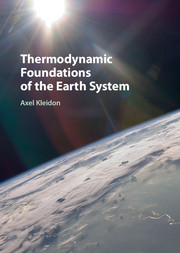Book contents
- Frontmatter
- Contents
- Preface
- List of Symbols
- 1 Thermodynamics and the Earth system
- 2 Energy and entropy
- 3 The first and second law of thermodynamics
- 4 Thermodynamic limits
- 5 Dynamics, structures, and maximization
- 6 Radiation
- 7 Motion
- 8 Hydrologic cycling
- 9 Geochemical cycling
- 10 Land
- 11 Human activity
- 12 The thermodynamic Earth system
- Glossary
- References
- Index
1 - Thermodynamics and the Earth system
Published online by Cambridge University Press: 05 March 2016
- Frontmatter
- Contents
- Preface
- List of Symbols
- 1 Thermodynamics and the Earth system
- 2 Energy and entropy
- 3 The first and second law of thermodynamics
- 4 Thermodynamic limits
- 5 Dynamics, structures, and maximization
- 6 Radiation
- 7 Motion
- 8 Hydrologic cycling
- 9 Geochemical cycling
- 10 Land
- 11 Human activity
- 12 The thermodynamic Earth system
- Glossary
- References
- Index
Summary
A thermodynamic basis for Earth system science
The Earth is a vastly complex system. This complexity is reflected in the broad range of processes that it entails, from the solar radiative forcing to the highly dynamic circulatory patterns in the atmosphere, ocean and the interior, to high level and diversity of metabolic activity of life, and to human activities. The complexity is further enhanced by strong interactions by which processes alter their own drivers. Atmospheric motion, for instance, transports such vast amounts of heat that it alters the radiative exchange with space. The activity of the Earth's biosphere, the sum of all living organisms, has strongly altered the chemical composition of the atmosphere, as for instance reflected in its high abundance of molecular oxygen, resulting in altered physical and chemical conditions. And finally, human activity over the last century has released such large amounts of buried organic carbon by its industrial activities that it has substantially altered the global carbon cycle resulting in enhanced concentrations of carbon dioxide in the atmosphere and global climate change. With such complexities in mind, it would seem almost impossible to make robust predictions of magnitudes, the strength of interactions, and the overall evolutionary direction of the Earth system as a whole in order to get a robust, physical understanding of how the whole Earth system functions and responds to change.
Yet there is a range of fundamental, practical, and relevant questions that require such a robust understanding. What determines, for instance, the strength of the atmospheric circulation and its ability to transport and mix heat and mass? The answer to this question would help us to make better predictions of the magnitude of climate system processes and how these would respond to perturbations and change. Does the climate system, and the planet as a whole, regulate its climatic state to some particular reference level? Is climate even regulated to a point that is most suitable to life, because of the presence of life, as proposed by the Gaia hypothesis (Lovelock 1972b,a; Lovelock and Margulis 1974)? If this is so, how would human activity play into such a planetary regulation? A better understanding of these questions would provide information about the role of the biosphere at the planetary scale and the factors that shape planetary habitability.
- Type
- Chapter
- Information
- Thermodynamic Foundations of the Earth System , pp. 1 - 18Publisher: Cambridge University PressPrint publication year: 2016



